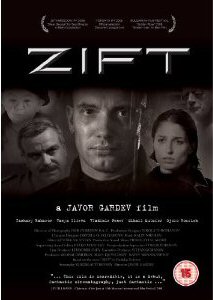
The fiercely proud, independent Moth (Zahary Baharov) narrates the story of his life, beginning from his humble and politically repressed beginning, before swiftly shifting to his adolescent move into the Bulgarian military service. Along the way we learn of his lifelong love for Ada (Tanya Ilieva), who he has spent his life yearning to be with.
Before long his army career is in tatters, and Moth winds up in military prison for a murder he didnít commit. Itís here that the filmís present starts, with Moth learning that he is about to be released onto the streets of 1960s Bulgaria Ė at the height of the countryís Communist regime.
On his day of release, Moth continues to narrate as he plans to check out a different Sofia to the one he once lived in ... and finally meet up with Ada.
But first, he has a score to settle with a corrupt prison guard. Bad move. This leads to Moth being beaten, and then kidnapped by soldiers who hurry him to a secret location where his former cellmate wants him tortured in a bid to discover the location of a huge diamond.
Itís the start of a long and gruelling reintroduction into the real world for Moth. Things donít get any easier along the way, but at least that means we the viewer get treated to more violent encounters, sharply paced action and the rather ravishing Ilieva.
ZIFT was Bulgariaís official entry for the category of Best Foreign Film at the 2009 Oscars. The award eventually went to Japanís DEPARTURES, ZIFT not actually making the shortlist on the night. But the fact that it was submitted for consideration at all demonstrates two things: the Bulgarians had complete faith in it above all other films they produced in 2008-09, and their concept of award-worthy films is nowhere near as stuffy as the English-speaking world.
Based on Vladivar Todorovís novel, the author also adapts his story for the screen. Coupled with Javor Gardevís flashy, stylish direction, this results in a film that is both derivative and strikingly unique. Its noirish monochrome photography continually strikes, while the comic strip pacing, cartoonish emphasis on good guys and baddies (although theyíre all villains to some extent), and unflinching forays into tightly edited violence canít help but bring the likes of SIN CITY to mind.
Thereís definitely an influence felt from contemporary directors here, be it the black humour and energetic cultural references that made PULP FICTION so fresh, or the editing and pace of Danny Boyleís TRAINSPOTTING. But the storyline, characters and a few set-pieces that would be bizarre enough to have made their way into an Alejandro Jodorowsky film ensure ZIFT retains an odd identity of its own.
Due to its period setting and highly stylised visual approach, itís difficult to view ZIFT as a cinematic snapshot of Bulgaria. However, thereís no doubt that the unsubtle screenplay employs characters designed to personify the nationís communist values, and the action is certainly propelled by themes of class, liberty and pride.
But, somehow, the film as a whole still feels superficial. The action sequences are expertly choreographed and filmed quite beautifully Ė but they donít quicken the heart-rate. For a thriller, thereís very little tension mustered. And the politics that Gardev buries beneath the sumptuous compositions repeatedly fails to provoke. The less said about the often risible, pseudo-philosophical dialogue, the better.
All of which leaves me with a dilemma: is ZIFT any good, or not? Itís brilliantly made on a technical level and will no doubt herald a new age for Bulgarian filmmaking, while Gardev must surely go on to forge an interesting cinematic career on the strength of his efforts here. But I canít say I liked the film tremendously, because it failed to hook me in on a dramatic level.
Still, it looks good and there are just about enough "what the fuck?" moments to make it worthwhile.
The film is presented uncut in its original aspect ratio of 2.35:1. Benefitting from a 16x9 enhancement, the transfer is a crisp and expertly contrasted affair, exhibiting an array of strong blacks and excellent, depth-creating lighter shades. Bright, clean and pin-sharp, this is what modern black-and-white film should look like. Amazingly, the look of the film is consistent throughout Ė despite the fact different eras of the movieís action were apparently shot in differing film stocks (16mm for the 1940s footage, 35mm for the 1960s, and so on).
Audio comes in a very healthy and evenly apportioned 5.1 mix. English subtitles are optional but advisable for those of us who donít speak fluent Bulgarian. They are well-written and, for the most part, easy to read against their monochrome setting.
The DVD opens with an energetic main menu page. From there, an animated scene-selection menu allows access to the film via 20 chapters.
Extras are limited to a 105-second original trailer Ė a breathless, cartoonish affair Ė and an 89-second gallery of behind-the-scenes photographs. The trailer is, bizarrely, graced with larger and preferable English subtitles to the smaller, italic ones on the main feature.
The disc also includes trailers for two other ISIS titles, RUNNING IN TRAFFIC and FATED.
It wouldíve been nice to have had more background information in the form of bonus features, as I imagine the making of ZIFT and what motivated it are probably as interesting as the film itself.
Still, ZIFT remains a beguiling film and its presentation here is nigh-on impeccable.
Review by Stuart Willis
| Released by ISIS Ltd |
| Region 2 - PAL |
| Rated 18 |
| Extras : |
| see main review |